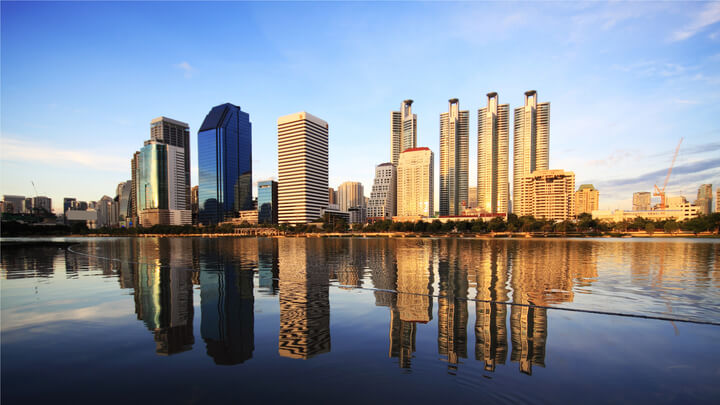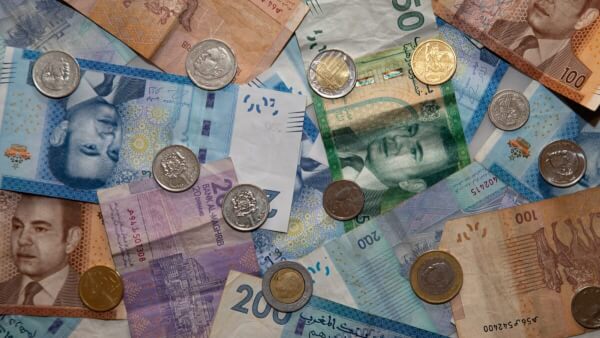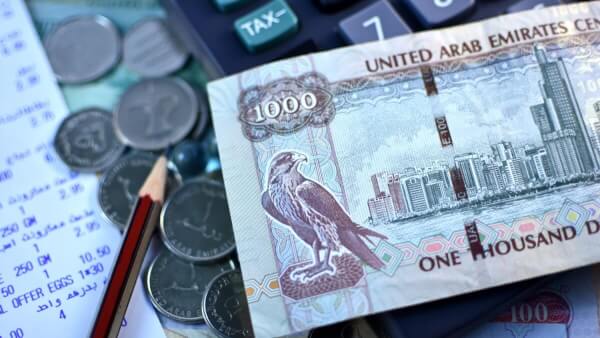Starling Bank limits: transfers, withdrawal, spending
Read our guide to Starling Bank limits on UK and international transfers, ATM withdrawals and card spending for personal customers.

Thailand is a dream holiday destination, but it can also be a great place to move for a longer period - to work, retire or study for example. If you’re planning an extended stay in Thailand you’ll need to make sure you have ways to manage your money in THB. This guide to opening a bank account in Thailand is a great place to start.
We’ll cover details about how banking in Thailand usually works, and how to open a bank account in Thailand. We’ll also show you how the Wise account can help if you need an account to hold and exchange THB before you travel, or if you need to send money from the UK to Thailand, or vice versa.
Depending on whether you already have the required documents, opening a bank account in Thailand may take some time. To get started, you’ll need:
Some banks may ask for more:
For expats, opening a bank account in Thailand can be a long, drawn out process as much of it depends on whether or not you have a work permit. If you don’t have a work visa, it may limit your options in terms of banks. However, there are still many banks which will allow you to open a current account without one, such as Bangkok Bank which is a main bank in Thailand.
If you already have your work permit, a non-immigrant B visa, a non-immigrant O-A visa, or a non-immigrant visa for business, then you should be eligible to open an account with most banks. From there, a passport may be all you need to begin the process.
Ensuring you’ve done your research on the requirements can go a long way; in some cases bank employees aren’t familiar with eligibility for expats wishing to open accounts. You may want to come prepared with a list of the requirements to share with the bank employee in order to speed up the process. Any given bank in Thailand will photocopy your documents and require your signature on a handful of forms.
You’ll probably not be able to open an account with a traditional Thai bank from abroad. Even where banks offer specific non-resident accounts, you’ll need to visit a branch in the first place to set up your account and have all your paperwork checked.
You’ll probably not be able to open an account with a traditional Thai bank from abroad. Even where banks offer specific non-resident accounts, you’ll need to visit a branch in the first place to set up your account and have all your paperwork checked.
Instead, why not get a multi-currency Wise account? You can open your Wise account from the UK, with a UK proof of ID and address, to hold, send, spend and exchange 40+ currencies, including Thai baht. That means you can top up in pounds, and either convert to THB right away, or get a linked Wise card which can autoconvert to THB - or whichever currency you need - with the Google rate and the lowest possible fees every time.
We’ll look a bit more at Wise international transfers and the Wise account, a little later, to help you decide if this option might suit you.
Eligibility is subject to verification of customers identity
You’ll usually have to visit a bank branch to open a bank account in Thailand. A member of the bank staff will verify your documents and witness your signing of your account documents. This usually applies even if you’re getting a non-resident account.
Once you’re in Thailand, opening an account shouldn’t be too tricky. Here are some different account types which may interest you.
Some banks offer non-resident account services which allow you to hold funds in foreign currencies and convert to THB whenever you need to.
To give an example, Bangkok Bank offers a non-resident account you can open with a minimum deposit of 1,000 USD or the equivalent in any of the 14 supported currencies¹. You’ll need to visit a branch with your passport and a supporting letter from a recognised organisation - such as your bank in your home country - to apply.
Student accounts are available from some Thai banks, provided you can come up with confirmation you’re a student at an eligible institution in Thailand.
If you’re a long term Thai resident you’ll have no shortage of choice for both banks and specific account products. Once you have all your paperwork in order, Thai banks offer all the services you might expect from a highstreet bank in the UK. Just remember, that fees may differ widely from what you’re used to at home - so it’s well worth reading all the terms and conditions for any product you’re interested in carefully before signing up.
Savings products include easy access accounts, fixed term deposits, and foreign currency deposit accounts.
Banking in Thailand often involves attending a branch in person. That means you might want to pick a bank based primarily on branch and ATM location. Online commentators also mention that different branches of the same bank are not necessarily all as well set up as each other to deal with foreign customers. So if you have a disappointing experience in one branch, it might be worth visiting another nearby just in case you get a better service.
Here are a few of the most popular banks in Thailand for foreign customers, based on the accounts available, and options for services in a foreign language.
To open a Thai bank account in the first place you’re likely to need to visit a branch. Not all branches of all banks have English speaking staff, so it’s worth calling ahead - locations in expat and tourist areas are more likely to be familiar with international customers.
When your account is set up, you’ll likely get a debit or ATM card, which can be handy for self service banking such as checking your balance or making a deposit via an ATM. Banks also normally have online banking services for convenience, although you’ll need to sign up. You’ll also need to confirm how often you want bank statements, and how you want to receive them - banks are likely to check this at the point you open your account.
If you need a branch service you’ll need to double check opening hours before you set out. Monday to Friday, 10:30am to 4:00pm is common. However, some banks, like Bangkok Bank also have micro branches - in this case in partnership with Big C - which offer daily service with longer hours, but with a more limited range of features.
If you’re not likely to use in person banking facilities anyway, you might find you get a better online and mobile experience, and lower fees with a multi-currency Wise account. Open a Wise account online or in the Wise app before you head to Thailand, and keep on top of your money on the move with the intuitive mobile app. There’s no minimum balance or maintenance fee, and mobile and online banking comes as standard.
Banking fees in Thailand are not likely to be the same as what you’re used to in the UK. You’ll need to review your account terms and conditions carefully, to make sure you don’t get any unwanted surprises. Here’s what to look out for:
ATM withdrawal free and conversion rate fees are typically waived if you use your bank’s ATM. If you don’t have a work permit or you know you won't be staying in Thailand for an extended period of time (i.e. between 3-7 months), some banks may be able to waive some of the fees.
It really is to your advantage to open a local account as it’s common for ATMs to charge a steep withdrawal fee when using a foreign card. Many banks in Thailand will charge you or require a certain amount of Thai Baht to open an account. However, if you haven’t opened your local account yet and are planning to withdraw money in Thailand, you can often avoid ATM withdrawal fees by going into the bank branch with your form of identification and requesting a withdrawal.
If low, transparent fees are important to you, check out the Wise account, which can hold and exchange 40+ currencies, including of course GBP and THB. There are no foreign transaction fees to pay, some free ATM withdrawals every month, and no minimum balance or ongoing charges to worry about. Plus, overseas transfers with Wise can be far cheaper* than relying on a regular bank. Read on for all you need to know about that.
Make Wise Your Travel Buddy ✈️
Wise will not charge you for these withdrawals, but some additional charges may occur from independent ATM networks
To review how much international transfer fees may be when you send money from Thailand to the UK, let’s look at a quick example. In this worked example we’ll imagine you’re sending 10,000 THB (at the time of writing around 250 GBP) to the UK.
| Provider | Transfer fee | Exchange rate |
|---|---|---|
| Kasikorn Bank | 500 THB + 1,200 THB foreign bank fee | Mid-market exchange rate + markup |
| Wise | 67.67 THB⁹ | The mid-market rate |
Transfer and exchange rates correct on 2nd Feburary 2023
Let’s break this down a bit. Kasikorn Bank - our example - has a fixed 500 THB fee for global remittances, regardless of the amount. You then have the option to designate your payment as an OUR payment or a BEN payment.
In an OUR payment, the sender covers all the intermediary bank costs - meaning you’ll pay 1,200 THB extra to Kasikorn.
If you prefer to pick a BEN payment, the recipient will pay the intermediary costs - the fees are deducted from the payment amount as it’s processed, and less is deposited into the recipient’s account in the end.
Kasikorn also is likely to use a marked up exchange rate - meaning there are extra fees tucked away here, too.
Wise, on the other hand, uses the mid-market exchange rate with no markup, and splits out the fees transparently. As Wise uses dynamic pricing which varies depending on the payment value, your 10,000 THB transfer to the UK only costs a fraction of Kasikorn’s fees. However, even if you were sending 100,000 THB, Wise still wins on fees overall - with a cost at the time of writing of just 559.96 THB, with no extra intermediary costs to worry about.
When you move to Thailand you’ll likely want to open a Thai bank account with a local provider once you settle in. This guide kickstarts your research on which to pick - plus you can get a Wise account to hold and exchange THB even before you travel.
And finally, once you’ve opened a local bank account in Thailand, don’t forget that using Wise for your cross border payments can mean a cheaper, faster and more convenient service. See how much you can save with Wise today.
All in all, opening a bank account in Thailand should be a fairly straightforward process. Having the right documents ready, you can hopefully open an account without too much hassle.
Sources used:
*Please see terms of use and product availability for your region or visit Wise fees and pricing for the most up to date pricing and fee information.
This publication is provided for general information purposes and does not constitute legal, tax or other professional advice from Wise Payments Limited or its subsidiaries and its affiliates, and it is not intended as a substitute for obtaining advice from a financial advisor or any other professional.
We make no representations, warranties or guarantees, whether expressed or implied, that the content in the publication is accurate, complete or up to date.

Read our guide to Starling Bank limits on UK and international transfers, ATM withdrawals and card spending for personal customers.

Find out how to open a Starling Bank account online in the UK with our comprehensive guide, covering eligibility, requirements and how to get started.

A list of the top 10 banks in Morocco, including CIH Bank, Attijariwafa Bank, Bank of Africa and Al Barid Bank.

A list of the top 10 banks in Dubai, including Emirates NBD, First Abu Dhabi Bank, Mashreq Bank, RAKBANK and HSBC UAE.

Looking to open a new bank account? Read our Halifax Reward current account review and find out everything you need to know.

Read our comprehensive guide to the best USD accounts in the UK, including features, fees and everything else you need to know.